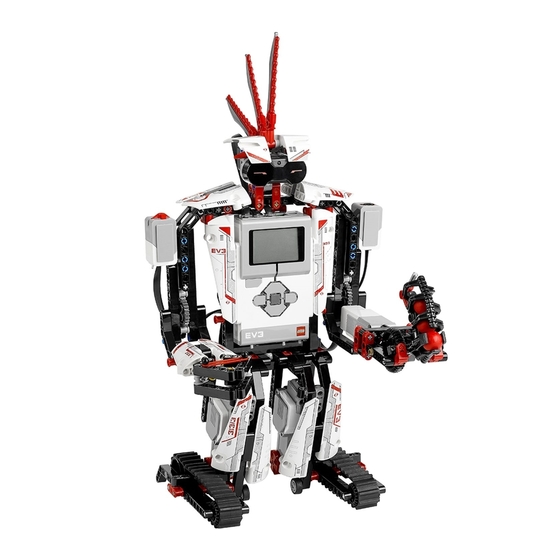LEGO MINDSTORMS Education EV3 Nächste Schritte mit - Seite 3
Blättern Sie online oder laden Sie pdf Nächste Schritte mit für Robotik LEGO MINDSTORMS Education EV3 herunter. LEGO MINDSTORMS Education EV3 24 Seiten. Micropython
Auch für LEGO MINDSTORMS Education EV3: Erste Schritte (17 seiten), Handbuch (26 seiten)

1. Explore Curriculum Coverage
Using LEGO
MINDSTORMS
Education EV3 in your classroom opens up the possibility for a variety of successful learning outcomes.
®
®
Skills such as teamwork, creativity, and problem-solving are an inherent part of the experience, and students' natural mastery of
digital technologies will help them to rapidly learn the language of programming.
Below is a selected overview of standards that are addressed or partially-addressed when using LEGO MINDSTORMS Education EV3.
This list will grow steadily as you expand the use of EV3 in your classroom.
Practices
• Asking questions
• Developing and using models
• Planning and carrying out investigations
• Analyzing and interpreting data
• Using mathematics and computational thinking
• Constructing explanations and designing solutions
• Engaging in argument from evidence
• Obtaining, evaluating, and communicating information
NGSS
LEGO, the LEGO logo, MINDSTORMS and the MINDSTORMS logo are trademarks of the/sont des marques de commerce du/son marcas registradas de LEGO Group. ©2018 The LEGO Group. 20171207
Computational Thinking
• Recognize that software is created to control computer operations
• Understand and use the basic steps in algorithmic problem-solving
• Develop a simple understanding of an algorithm
Computing Practices and Programming
• Use technology resources for problem-solving and self-directed learning
• Construct a program as a set of step-by-step instructions to be acted out
• Implement solutions to problems using a block-based visual programming
language
Computers and Computing Devices
• Use standard input and output devices to successfully operate computers
and related technologies
• Apply strategies for identifying simple hardware and software problems
that may occur during use
• Identify factors that distinguish humans from machines
• Recognize that computers model intelligent behavior (as found in
robotics, speech and language recognition, and computer animation)
CSTA
3
